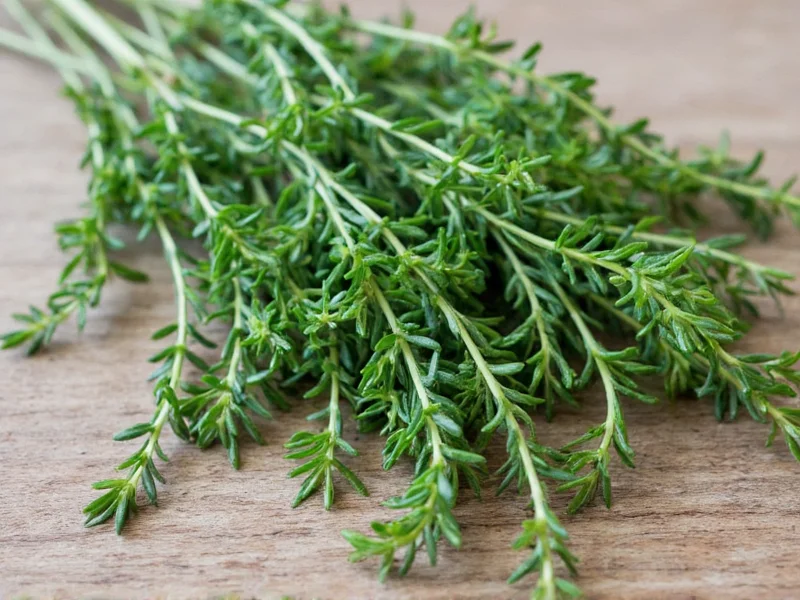When evaluating fresh thyme delivery options, understanding the supply chain is crucial for ensuring quality. Unlike dried thyme which maintains flavor for months, fresh thyme has a limited shelf life that begins diminishing immediately after harvest. The most reliable delivery services implement strict temperature controls and use moisture-regulating packaging to preserve herb quality during transit.
Understanding Fresh Thyme Delivery Channels
Consumers have multiple pathways to obtain fresh thyme through delivery services, each with distinct advantages and limitations. Knowing these differences helps match your needs with the appropriate service.
Grocery Delivery Services
Nationwide grocery delivery platforms like Instacart, Amazon Fresh, and Shipt partner with local supermarkets to deliver fresh thyme alongside regular grocery orders. These services typically offer same-day or next-day delivery with thyme sourced from regional distribution centers. The harvest-to-shelf timeline usually ranges from 3-7 days, though premium services like Whole Foods' Amazon Fresh delivery often maintain shorter supply chains.
When ordering through grocery delivery services, look for "locally sourced" or "farm-direct" labels which indicate potentially fresher product. Peak season availability (spring through fall) generally yields better quality than winter months when thyme is shipped longer distances.
Specialty Herb and Produce Delivery
Dedicated herb suppliers like Melissa's Produce and specialty farm-to-table services such as Farmbox Direct offer superior freshness for culinary enthusiasts. These providers typically harvest thyme within 24 hours of shipping and use insulated packaging with cooling elements to maintain optimal temperature (32-36°F) during transit.
The trade-off for this enhanced freshness is longer delivery times (2-4 business days) and higher costs. However, for professional chefs or serious home cooks requiring maximum flavor intensity, these services deliver noticeably better quality than standard grocery options. Some specialty providers also offer organic certification and pesticide-free growing practices for health-conscious consumers.
Meal Kit Services with Fresh Herbs
Meal kit companies including HelloFresh, Blue Apron, and Home Chef have optimized their supply chains specifically for fresh herb delivery. Their business model depends on delivering high-quality ingredients, so they've developed efficient systems for preserving thyme freshness.
These services typically deliver thyme in small quantities appropriate for specific recipes, reducing waste. The herbs arrive in moisture-controlled packaging that extends shelf life by 2-3 days compared to standard grocery store packaging. While you can't order thyme separately through these services, they represent an excellent option if you're already using meal kits and want consistently fresh herbs.
Evaluating Fresh Thyme Quality Upon Delivery
Regardless of delivery method, assessing thyme quality immediately upon arrival ensures you receive what you paid for. Understanding the visual and sensory indicators of freshness helps identify subpar products before they spoil.
Visual Quality Indicators
Fresh thyme should display vibrant green leaves without yellowing or browning. The stems should appear firm and slightly woody at the base, not slimy or discolored. Avoid bundles where leaves appear wilted, dry, or easily detach from stems. Small amounts of moisture in packaging are normal (indicating recent washing), but standing water suggests improper handling that accelerates spoilage.
Sensory Assessment Techniques
The most reliable freshness test involves smell and touch. Gently rub a few leaves between your fingers - fresh thyme releases a strong, pleasant herbal aroma immediately. If little to no fragrance emerges, the thyme has likely lost significant flavor compounds. The leaves should feel slightly springy to the touch, not brittle or overly soft. Properly handled thyme maintains its essential oils that provide both flavor and aroma.
| Delivery Service Type | Typical Harvest-to-Door Time | Price Range (per ounce) | Quality Rating | Best For |
|---|---|---|---|---|
| Major Grocery Delivery | 3-7 days | $0.80-$1.50 | ★★★☆☆ | Convenience, regular cooking needs |
| Specialty Herb Farms | 24-48 hours | $1.75-$3.00 | ★★★★★ | Professional cooking, special occasions |
| Meal Kit Services | 2-3 days | Included in meal price | ★★★★☆ | Recipe-specific use, minimal waste |
| Local Farmers Markets (Delivery) | 1-3 days | $1.25-$2.00 | ★★★★☆ | Supporting local agriculture |
Maximizing Freshness After Delivery
Proper handling after your fresh thyme delivery arrives significantly extends its usable life. Implement these storage techniques to maintain quality:
Immediate Post-Delivery Processing
Remove thyme from delivery packaging immediately upon arrival. Trim approximately ¼ inch from the stem ends and place in a glass with ½ inch of cool water, similar to cut flowers. Cover loosely with a plastic bag and refrigerate. This method typically extends freshness by 7-10 days compared to leaving thyme in original packaging.
Long-Term Storage Options
For extended preservation, consider freezing fresh thyme. Remove leaves from stems and freeze in ice cube trays with olive oil or water. Alternatively, dry thyme by hanging small bundles upside down in a warm, dark place for 1-2 weeks. Properly dried thyme retains significant flavor for 6-12 months when stored in airtight containers away from light.
Seasonal Considerations for Fresh Thyme Delivery
Thyme quality varies significantly by season due to growing conditions. Understanding these patterns helps set appropriate expectations for delivered product.
Spring and summer deliveries typically feature the most vibrant, flavorful thyme as plants grow actively in warm conditions with ample sunlight. Fall harvests remain high quality but may show slightly less intense flavor. Winter thyme, often grown in greenhouses or shipped from southern hemisphere sources, generally has milder flavor and softer texture.
When ordering during winter months, look for services specifying "greenhouse-grown" or "hydroponic" thyme, which often maintains better quality than field-grown options harvested in cold conditions. Some specialty providers offer climate-controlled growing year-round for consistent quality.











 浙公网安备
33010002000092号
浙公网安备
33010002000092号 浙B2-20120091-4
浙B2-20120091-4